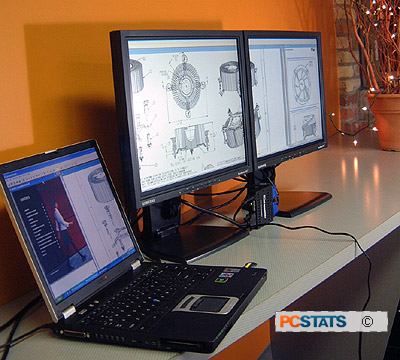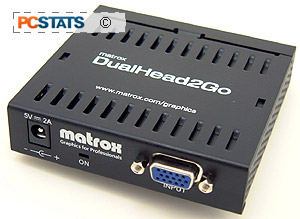The next question we wanted to answer is how DVD
playback reacts to the Matrox DualHead2Go? It's a lot of 'monitor' after
all, so why not take
advantage of it! While the DualHead2Go is clearly not designed to support
3D gaming experiences, it handles DVD playback just fine.
There are a couple
quirks inherent to watching a DVD movie on a screen effectively having
a shape that is twice as wide as it is high. For
starters, the DVD screen automatically centers between the two displays when it is
maximized. In tests limited to PowerDVD software, it
was also evident that a DVD movie doesn't necessarily react too kindly
to having its the aspect ratio completely ignored either.
 Having done just that to
enlarge the image into the full screen (2560x1024), resulted in a line by line
misalignment of about 10 pixels of the movie - adjacent desktop icons and menus
and such were completely unaffected. With 'keep
aspect ratio' toggled on, the DVD picture regained cohesiveness.
Having done just that to
enlarge the image into the full screen (2560x1024), resulted in a line by line
misalignment of about 10 pixels of the movie - adjacent desktop icons and menus
and such were completely unaffected. With 'keep
aspect ratio' toggled on, the DVD picture regained cohesiveness.
Lag and Load?
Another point of consideration is
whether or not the Matrox DualHead2Go will add any extra load onto
the PC subsystem or otherwise slow the computer down.
Generally speaking, since the graphics processing is completely
handled by the notebooks' onboard videocard, the DualHead2Go device isn't going to
have any effect in and of itself. Attempts were made to benchmark the Toshiba Tecra
M3 notebook with some office productivity benchmarks to compare single screen versus dual
screen performance. However, this failed because the benchmarks were not capable of
spanning over the secondary monitor during the test phase.
Running through spreadsheets and multiple windows didn't
cause any noticeable slowdowns, but judging by
the increased speed of the notebook cooling solution, the Geforce Go 6200
TE was working a little harder to output 2560x1024.
The only application were we found a noticeable
difference with was Adobe Acrobat. To fill twin 1280x1024 screens full
screen with a PDF document requires that the document be enlarged by
about 400%. The image rendering time was visibly slow with a
complex line graphic, but such was the case with the same document
blown up to 400% on single screen as well.
|
experts tip: adjust monitor colour temperature |
|
every modern lcd or crt monitor is going to have a panel in its on screen display (osd) menu that allows a user to
change the colour temperature of the display. these colour settings are measured
in degrees kelvin, and there are typically three values to choose from:
5000°k, 6500°k and 9300°k. each colour temperature relates to the type
of lighting that exists where the monitor is being used, but
on average 6500°k is the most ideal colour temperature to select. when
two or more monitors are put side-to-side, it is important to
ensure that all displays have the colour temperature setting, or one picture might
look extra-blue while the next looks too red. if this happens to
be the case, check the monitor settings first to be sure it is
configured for 6500°k before fiddling around with videocard's software colour
correction options. Following this quick little tip will ensure your multi-display set up looks its best. |
| Comments and Feedback? Suggest a
Tweak. |
Conclusions
The inner workings of the Matrox DualHead2Go are pretty
simple. The device essentially just manipulates a monitor signal from the host
PC that is twice as wide horizontally. The graphics adapter in the laptop
handles all the processing, and so the DualHead2Go has no adverse affect on
picture quality, speed, or CPU load.
Dual Display
Capability for a
Notebook
Matrox's DualHead2Go Analog Edition is a
unique product that bridges the feature gap which previously separated office PCs from office notebooks in one
very specific respect. What the DualHead2Go does is allow users with compatible
integrated graphics chipsets the possibility of connecting multiple displays to their notebook computer. In that
respect, this device isn't for everyone.
 It's hardware compatibility is good for recent mobile video chipsets, but
it's not universal. In our own tests, driver versions also appear to influence
how well the unit behaves. That said, there are certainly going to be
professional users who have been waiting for something like the Matrox
DualHead2Go, and they may very well embrace this technology which addresses the
lack of multi-display options for laptop computers.
It's hardware compatibility is good for recent mobile video chipsets, but
it's not universal. In our own tests, driver versions also appear to influence
how well the unit behaves. That said, there are certainly going to be
professional users who have been waiting for something like the Matrox
DualHead2Go, and they may very well embrace this technology which addresses the
lack of multi-display options for laptop computers.
As notebooks continue to improve their market share in both corporate and
educational environments, employees and students transition away from the static desktop systems of old. Increasingly powerful notebooks
are being used for gaming, and for computer aided design (CAD), accounting, graphic design, business
presentations, and any number of other tasks; so why not incorporate some multi-display
functionality in there too?
Most likely the Matrox DualHead2Go will find a welcome
place in the dusty pile of cables that clutter the home and office desks of keen
IT workers. It's a clever solution to a simple problem, and does its task well.
The Matrox DualHead2Go is available from the usual online
retailers, and directly from Matrox for about $169USD.
Find out about this and many other reviews by
joining the Weekly PCstats.com
Newsletter today! Catch all of PCstats latest hardware reviews right here.
Related
Articles
Here are a few other articles that you might enjoy
as well...
1. Samsung Syncmaster 173P+ 17inch LCD Display Review
2. Samsung SyncMaster 930MP 19-inch LCD Monitor Review
3. JustCom JC-M104U 4-Port USB KVM Switch Review
4. Samsung SyncMaster 243T 24-inch LCD Display Review
5. Samsung Syncmaster 173P 17-inch LCD Display Review
